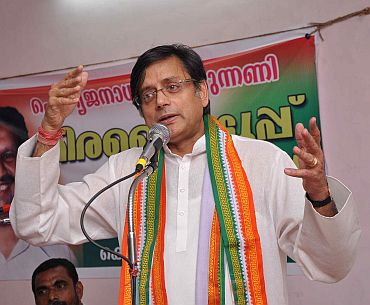
Thiruvananthapuram member of Parliament Shashi Tharoor, star campaigner for the Congress-led United Democratic Front in the Kerala assembly elections, speaks to Shobha Warrier about all things political.
Ever since Congress Member of Parliament Shashi Tharoor lost the central minister's post, he has been spending most of his time in Thiruvananthapuram, his constituency. He has also been meeting the people who elected him by a huge margin.
It is true that the educated middle class and the young of the city are enamoured of his charm and the intellectual aura that he has.
Complete Coverage: Assembly Elections 2011
It was in the evening when Shashi Tharoor was campaigning in the suburbs of Thiruvananthapuram that I interviewed him, travelling with him in his car from one assembly constituency to another.
Unfortunately, the constituency he was given by the Kerala Pradesh Congress Committee that day was in the interiors where not many have heard of his United Nations tenure or the many popular books penned by him. All they did was shout 'Shashi Tharoor zindabad' and laugh at his jibes at the ruling Left Democratic Front!
Watch Shashi Tharoor campaign: Video 1 Video 2 Video 3 Video 4
Please ..
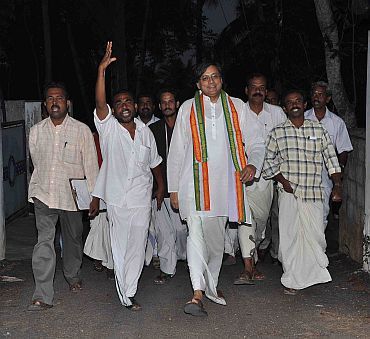
Were you surprised to hear the results of a survey conducted by an English newspaper among the youth in Kerala that said you are the most admired politician after (Congress general secretary) Rahul Gandhi?
Of course, I was pleasantly surprised. It was very gratifying. I think, to most of them I represent a certain freshness because I didn't come into politics as if it was my profession; I came having done my profession elsewhere. I was all around the world and was an author having written books. I came back to my country as I felt I could make a contribution.
Did you find the transition tough?
Clearly it wasn't an easy transition. I found the initial process quite tough. When the election results were out, me winning with the largest majority which the city has not seen in 50 years, I felt quite gratified. Then, of course I stumbled into other problems.
The toughest part was, there were so many who were willing to go to extreme lengths to bring me down, using the deliberate and malicious distortions of what I said. It was very clear that what I intended to say was in anyway not meant to be harmful. But the deliberate twisting that took place was a lesson for me, and that was the tougher part in the beginning of my political career.
My second year in politics is coming to an end; I joined politics this time in March 2009. I am much more at ease and others in the political world are much more at ease with me!
At any point, did you regret the decision to join politics?
There were always moments when you wondered, 'what are you doing here?' But I am not somebody who gives up easily at anything I have done.
My life has been full of challenges and that I feel is a blessing. There is no point in living if you don't have to extend and stretch yourself.
Because I faced challenges all these years, I don't give up that easily. If you allow any setback to throw you off stride, the stride was not worthwhile in the first place.
I believe that if you have taken on something, you have to do it. That is what I am doing now, through ups and downs, and I must say that the downs have been pretty low, especially last year. Of course, the ups have been very gratifying.
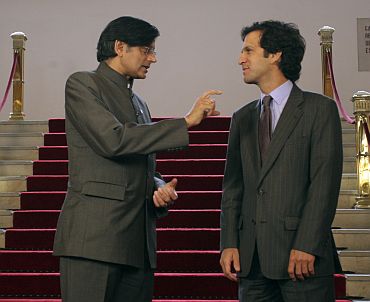
Do you miss being a minister?
It was a different life. As a minister, the challenge was, I was not able to do anything for my constituency as the ministry was very demanding.
I used to have 17-18 appointments a day in addition to files to see, speeches to deliver and visits to make to various countries. It was an extremely time consuming ministership unlike that of some of my other MoS colleagues.
On top of that, I was a Lok Sabha MP and not a Rajya Sabha MP, and I had a lot of demands from my constituency.
Now, I can focus on the constituency and if I have any time after that, I can do other things that interest me like watching a cricket match or writing an article or column, which I have started doing now.
I am always busy and my family says I am a magnet for work. So, I never had an idle moment.
But the thing that I miss about the ministership is the opportunity to represent the country because before that, for three decades, I was an international civil servant and the most senior Indian at the UN system. I worked for the UN and not for India. So, it is a privilege to serve one's own country which I was doing as a minister. But that privilege lasted for a shorter period.
From representing India in various countries to attending residential association meetings in Thiruvananthapuram, how do you feel about the sudden change?
Yes, it is a major change but then one can't look back. There is a logic to the world I live in and function.

Could you fit into the new role?
I always resented people alleging that I am a misfit (in politics). I feel if you are sufficiently flexible and adaptable in your imagination, you can fit in to anything. The question is, how good are you at it?
I am telling you, I have been quite happy talking to labourers, auto-rickshaw drivers, people in the chaya kada (tea shop) where I frequently step in during my travel in the constituency, and I don't find myself ill at ease. I don't find them also ill at ease with me.
Can we expect another Great Indian Novel from you soon?
Eventually, maybe. I am not in this profession for such a long time to detach myself from it and think about it to write a book. In my mind, I can very well imagine myself in politics for a long time.
So, I don't have a short term plan to write a book about politics, fiction or non-fiction. I am too immersed in this world to write about it.
Now that you are admired as a politician by the young of Kerala, have you any plans to target them in any way?
As a politician, I would say I leave that to the party. In this particular election, I am pleasantly surprised to be named a 'star campaigner' on the basis of which I would be campaigning in many parts of the state.
I assume it means I have some appeal and the party likes to use that. Frankly, when you campaign, you don't look at the age group of those who are there. I am equally at ease with people of all age groups.
Why I asked the question was, the young of the country feel that they don't have leaders to look up to. So, if they look up to you, do you feel like doing something for the group?
Part of my appeal is the fact that I am not a traditional politician. I am not carrying with me the baggage of many decades of political promises, fulfilled or unfulfilled. I have come in with a genuine desire to bring in my own voice from my own experiences and my own perspectives and thus bring in change.
You said you are not a traditional politician. How will you react to the kind of corruption that is widespread across the political system?
This is a genuine issue for all of us. I came with many years of international service and savings behind me. Therefore, I can afford to take the position that even for the elections, I would not take any contribution from anybody other than my party.
In all fairness, many candidates in politics are dependant on other sources of funding. I think that's where the problem starts. When you are spending money you don't have, the temptation to try and find some way of making it is always there.
As much as political corruption is a real problem, it can be tackled through a combination of factors. Obviously through legislation, significantly through vigilance, punishing the guilty, and so on.
There has to be an action by society at large also. There is no one-sided corruption. Somebody is giving it and somebody is taking it.
The person who is giving has to stop it so that the person who is taking cannot take. My worry is that a lot of the corruption is slightly hypocritical.
When you say politicians are corrupt, who makes them corrupt? Why is it that in our society, all of us tolerate the question of giving bribes for routine services? Why can't we stand up and refuse to pay the bribe? Let us see what happens. Let us go public if someone asks for a bribe. We have a free press.
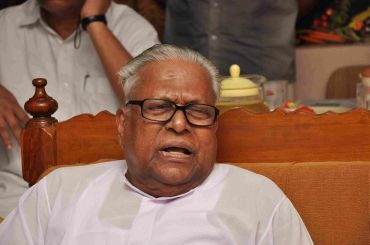
What kind of impact will the 2G spectrum (scam) have ion the Kerala elections?
A direct impact is unlikely. There has been a general concern about corruption issues. The real problem in Kerala is that the voters have suffered five years of an indifferent, incompetent and under-performing government. So, the voters will feel the alternative is better.
Thousands of youngsters from Kerala are going out of the state for employment. Does the United Democratic Front have any plans to provide them with employment in Kerala itself?
The UDF will not bank on just anti-incumbency. We are coming out with a positive message. We are telling them that we have a vision about their future, and we are concerned. After all, how can a young person in the 21st century, in all conscience, vote for a party so mired in 19th century ideology? It is a party that opposed the introduction of computers to India; it's a party that opposed the introduction of mobile phones in India.
If you are concerned about the future of our country, you need to have people with a vision for the future. We need to have more opportunities to generate employment for the young.
We have five million young people between the ages of 15 and 24. Who is going to provide jobs for them? The Left is opposed to anything that generates jobs.
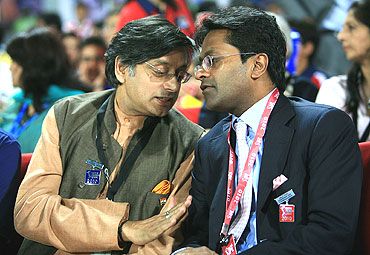
Is it true that you are bringing Oracle to Thiruvananthapuram?
The official announcement is expected later. A couple of business papers have already reported it. Yes, Oracle is coming to Techno Park in Thiruvananthapuram. And, yes, I did lobby and that is not a secret.
I lobbied for the state and the Techno Park, and I conducted a video conference last year. I want to create a knowledge economy and bring in world class companies to Kerala. Our Techno Park is the first in India but we don't have an IBM or an Oracle or any of the top-notch companies here.
So, Oracle would be the first. With this, we can transform the image of Kerala.
I used the goodwill and contacts I had developed over the years. That is how I brought the Hay Literary festival for the first time to India and to Kerala, and my own constituency. It was a huge success. That was opening the windows of Kerala to the world.
Even my endeavour to persuade the investors of the Indian Premier League cricket team to come to Kerala was to prove first of all that non-Keralites can invest in Kerala's future so that we can give opportunities to the young in Kerala, whether they are cricketers or cricket fans.
But at the cost of your ministership...
I know. I had to pay the price. To some degrees, it bewilders me. After all, there was no misuse of public office. I wasn't issuing licences for cricket from my ministry or issuing flats to cricketers from my ministry.
What exactly I was supposed to have done wrong still remains a mystery to me! When so much of fuss was made in the middle of the budget session, I felt what was decent to do in the highest traditions of politics was step aside. I didn't want to be a source of embarrassment and that was what I did then.
When you were young, were you politically aware and active?
I was very politically interested. I was, in fact, the elected president of a college union of the Delhi University.
Which ideology did you follow?
In those days, I was considered to be right of centre. I don't mean right of centre in the bigotry of the Jan Sanghis of those days or the Bharatiya Janata Party. Right of centre in the sense that freeing the creative energies of the people to liberate our economy and liberate our system. The kind of liberalisation that happened from 1991, I used to argue for in the '70s in college. In that way, I was right of centre.
Today, my views are more mainstream.
Do you approve of politics on campus?
I think it is a very difficult question to answer. When I was a student leader, I was opposed to our union getting involved in any of the political affiliations. Ours was a non-political union.
Today, as a Congress party politician, obviously my perspective has changed. We all want to mobilise and energise our young people. Therefore, student movements affiliated to us have some value to us.
Of course, students should study and politics should not come at the expense of studies. I was a university rank-holder and at the same time involved myself in all kinds of extracurricular activities. Similarly, you can be an excellent student and also get engaged in politics.